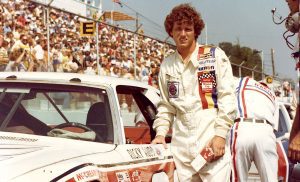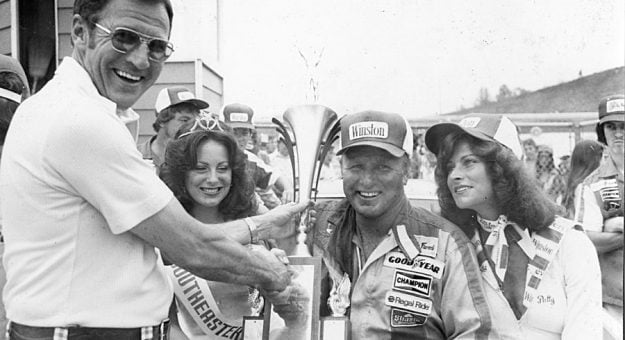Editor’s Note: NASCAR is celebrating its 75th anniversary in 2023. SPEED SPORT was founded in 1934 and was already on its way to becoming America’s Motorsports Authority when NASCAR was formed. As a result, we will bring you Part 30 of a 75-part series on the history of NASCAR as told in the pages of National Speed Sport News and SPEED SPORT Magazine.
Cale Yarborough ended the 1977 NASCAR Winston Cup season in the same place as 1976: at the top of the points.
Yarborough began his quest for his second consecutive Winston Cup championship at Riverside (Calif.) Int’l Raceway and led 102 of the 199 laps but finished second to David Pearson. Meanwhile, the sponsor of the initial race of the season and the title sponsor for the Winston Cup division, R.J. Reynolds Tobacco Co., was beginning its seventh year of NASCAR sponsorship.
The Feb. 16 issue of National Speed Sport News gave some of NASCAR’s top drivers, including Yarborough and Richard Petty, a chance to offer their impressions of the partnership.
“When R.J. Reynolds stepped in, it was a God-sent thing,” said six-time champion Petty. “Winston’s participation has brought out more fans by making the competition more intense, and attendance grows every year.”
According to an annual motorsports survey conducted by Goodyear Tire and Rubber Co., NASCAR Winston Cup events attracted 1,431,292 spectators in 1976 to make it the most-watched brand of racing in the world. Yarborough, fresh off his first title, did not need numbers to convince him: “The Winston folks coming into racing has done more for the sport than any other single thing since I have been in racing.”
Ralph Seagraves, manager of the special events at R.J. Reynolds agreed with Yarborough: “Our six years with NASCAR have been very rewarding and I’m sure the seventh will be even more rewarding.”
1977 Daytona 500 Results
NASCAR’s most prestigious race, the Daytona 500, fell to Winston Cup’s stocky legend. Yarborough outlasted Benny Parsons to win the 500 for the second time. The victory gave him a clean sweep at Daytona lnt’l Speedway as he won his 125-mile qualifying race and the International Race of Champions event.
Twelfth at Daytona was rookie Janet Guthrie, who became the first woman to enter Winston Cup competition since 1965 with her 15th-place finish in 1976’s World 600 at Charlotte Motor Speedway.
This season she competed for Citicorp Rookie of the Year honors in a Kelly Girl-sponsored Chevrolet. After finishing 10th at Michigan Int’l Speedway, a season-best sixth at Bristol Motor Speedway and ninth at Charlotte Motor Speedway and North Carolina Motor Speedway, Guthrie ended the season third in the rookie point chase and 23rd overall.

Ricky Rudd: Down To One Engine
Twenty-year-old Ricky Rudd, of Chesapeake, Va., made 25 of the 30 races and was named rookie of the year.
Yet, Rudd, like many other drivers, raced from purse-to-purse without a major sponsor to offset the cost of competing at NASCAR’s highest level. By the July 31 race at Pocono Raceway, Rudd’s team was down to its last viable engine.
The financial strain on Rudd became apparent after his solid seventh-place showing at Pocono: “We looked good today, but the future isn’t as good,” Rudd said. “We might have to park it.”
Fortunately, Rudd scraped enough money together to purchase a new engine from the Di-Gard team after his last engine blew during practice at Talladega, Ala. With the new engine, Rudd sped to his best finish of the season and the highest rookie finish in a Winston Cup race since 1974: fourth. Rudd collected 10 top-10 finishes en route to the rookie title.
Yarborough On A Tear
Defending Winston Cup champion Yarborough set on a tear through the Winston Cup schedule after his victory at Daytona. He bested rising star Darrell Waltrip at Richmond (Va.) Raceway and edged Petty to win at North Wilkesboro (N.C.) Speedway.
In April, Yarborough had the kind of race most drivers never even dream of. He led 495 of the 500 laps to win the Southeastern 500 at Bristol (Tenn.) Motor Speedway by even laps. One week later, the point leader won the rain-shortened Virginia 500 at Martinsville Speedway.
Fourteen-time Martinsville Speedway victor and No. 2 man in points, Petty, finished third at Martinsville, 20th at Talladega and fifth at Nashville Fairgrounds Speedway. These less-than-stellar performances-by Petty standards and the sixth victory in a row by a Chevrolet pushed the six-time champ to vent his frustrations in the May 11 issue of NSSN:
“NASCAR ought to change the rules about that slope front end (Chevrolets) have, but they ain’t gonna change nothing,” Petty said. Then he added: “They’re cutting their own throats, though, because (the fans) don’t want to come see a Chevrolet win every race.”
Yet, the controversial Monte Carlo, with its engine sitting farther back in the chassis than in other Winston Cup cars, not the more-maligned, sloped-nose Chevrolet S-3 Laguna Petty mentioned, sat in victory lane for most of Chevrolet’s 21 victories this season. Petty’s 1974 Dodge Charger even outran these superspeedway-engineered cars in each of his five victories.
However, Petty’s superspeedway success and Yarborough’s cooler second half (he won two of the last 15 races after a seven-of-15 start) did not the change the final standings. Yarborough completed all 30 events, won nine and racked up 25 top-five finishes and 27 top-10s on his way to a record 5,000 points and his second consecutive Winston Cup title.
In NASCAR’s other divisions, Jerry Cook won the modified title for the sixth time, this time by 1,101 points. Cook had now finished first or second in the modified points every year since 1969.
In the late model sportsman division, Butch Lindley took top honors, while Bill Schmitt was the Winston West champ.
